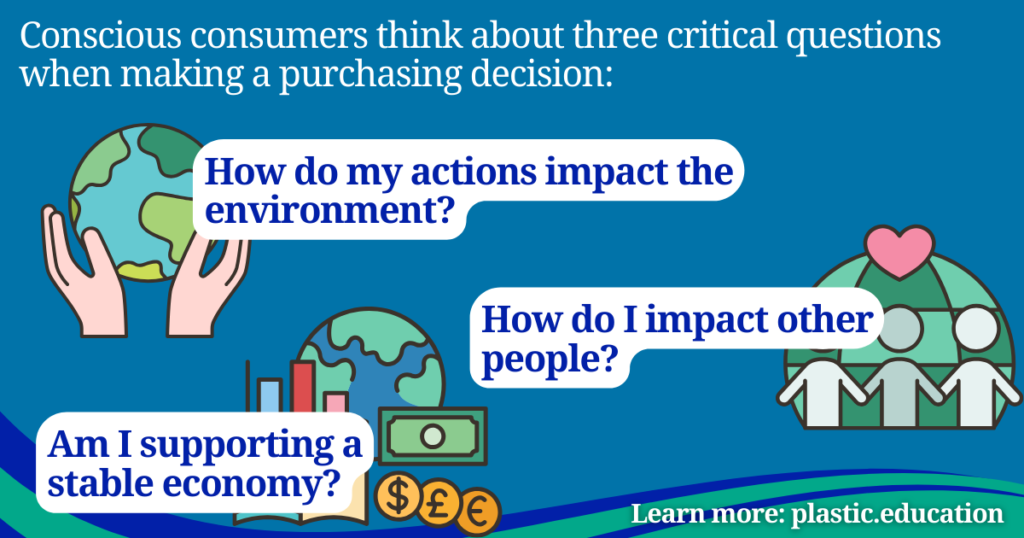What is Conscious Consumerism?
The defining quality: Conscious consumers are aware that their actions, big or small, have an influence on their personal health, the environment, society, and the economy. They consider the impact of their actions (usually purchases) and actively work to be a healthier more responsible citizen.
Conscious consumers understand they can improve their personal well-being and do something good for the environment, society, and economy regularly, just by adjusting a few of their habits.
A conscious consumer will pay a little bit more for a product that is healthier, environmentally responsible, and socially responsible because they understand the true value of the product is not reflected solely in the price tag. A product’s value can also be measured by its impact on the environment, society, and economy.
The rationale behind conscious consumption
A conscious consumer’s decisions are basically a vote for what they believe is right or wrong. They will support things that share their values and boycott those that don’t…
It’s most commonly practiced when it comes to buying stuff.
Supporting or boycotting brands
When we buy a product, we give a store, a distributor/manufacturer/brand our money. We give them our vote – “We’ve selected your product or service over your competitors because we think it’s better in some way or form”.
The more we support stores, suppliers, and brands that have good policies which align with our personal values, the more we encourage their actions. The same is true when we boycott. If we continue to buy products that are bad for our health and come from companies that pollute our environment and treat their employees poorly, they will continue to do so.
Day after day, these small decisions add up and our impact can be huge.
More Info: Brand Guides
More About Conscious Consumerism
Conscious consumers usually think about three key areas when assessing the value of a good or service they are considering:
- The Environment – How do my actions impact the environment? Am I contributing to the extinction of a species because my purchasing habits support companies with irresponsible sourcing policies?
- Society – How do my actions affect other people? If I buy this piece of clothing am I supporting an industry that uses slave labor to keep costs down?
- The Economy – Are my purchases supporting a sustainable economy or a boom and bust economy? Am I supporting corporations that are planning for long term growth or just a trying to earn a quick buck for their shareholders?

Learn more about how conscious consumers think about the environment, society, and economy as they relate to these common topics:
Environmentally Conscious
- Major Environmental Issues
- Eco Friendly Products
- Environmentally Responsible Brands
- Environmental Activists
- Environmental Sustainability
Socially Conscious
- Understanding Major Social Issues
- Supporting Ethical Business
- Corporate Social Responsibility (CSR)
- Socially Responsible Investing (SRI)
Economically Responsible
- Conscious Capitalism
- Economic Sustainability
Conscious Consumerism Reaches Beyond Environment, Society, Economy
“Consumption” is not limited to our use and disposal of stuff. We also consume natural resources like energy and water, as well as unnatural resources like media and services of all kinds every day. Not many people consider how our extensive use of mobile devices directly impacts our daily lives and indirectly impact the world around us. Likewise, we often overlook the value of our natural resources.
Here are a few other areas of consumption we can be conscious about:
- Energy – Electricity is the quintessential example of energy use. What about all the energy that goes into producing our food? How much food do we waste?
- Media – TV, apps, magazines, etc… How we interact with social media, the books we read, and the places we go – they all have an impact. Time is money. Anytime we give our attention to an app, TV show, or website we are supporting them. More about how our time is the new currency.
- Services – Aside from products we can also be conscious about services. Do you support your local credit union that invests in local business or are you banking with a large institution that contributed to the 2008 financial crisis?
- Water – Overconsumption of water in Southern California continually starves the Colorado River and central California river valley of natural resources impacting the ecology in ways that are still unfolding. As one of the biggest environmental concerns today, it’s something we should all be conscious of.
